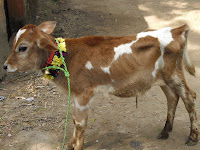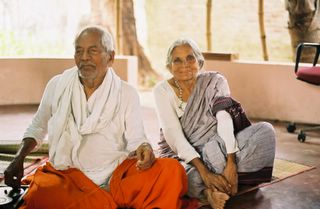In the Darkness, There is Light

A staff meeting is held, with approximately 40 of the 56 LAFTI staff present. I am the first order of business. I hand around a tray of dried cherries from Washington State. This has become a tradition with me, as the cherries are a reminder that there are migrant laborers living in poor conditions in the United States and elsewhere, as well as in India. I bring greetings from Friends of LAFTI and from my Quaker Meeting; I give a tee-shirt with Friends of LAFTI on it to Veerasami, and my traveling minute to Vengopu. We have a moment of silence in memory of George Willoughby, known and loved by everyone here. Then I launch into discussions of my family, the Foundation, efforts with Friendly Water for the World to launch further efforts to build biosand water filters, announcement of the first biosand water filter training to be held here in Kuthur in June and facilitated by two LAFTI staff, efforts to restore prawn farm land. I explain my “deal” with Amma, give Gandhi my computer (which I will actually have for the rest of my trip.) We joke that I am only temporarily Krishnammal’s dog but Gandhi has the post permanently, so we nickname name “Tipu (after Sathya’s dog) Gandhi”. Veerasami asks what about him? I dub him “Tambi (younger brother) Dog.” I show them my 10-year, multiple-entry visa to indicate that I plan to be back. Finally, every staff member gets a 100-rupee ($2.20) “housing movement pongal” bonus from Friends of LAFTI – each one steps forward in turn and is cheered. Now we have work to do.
(Nagaraj and his friends have just run in and are crowding around me, so it is time for an ad hoc English lesson; they are coming along just fine! Then they head back to the porch for their daily study session.)
We are about to go on our rounds, when three people – two women and one man – arrive from a remote village. It seems that an absentee landlord has left his 70 acres of land lie fallow for the past five years, and as a result the people have no work and are hungry. (The first order of business is to feed them.) They say they are close to having to become migrant laborers, even though they have lived here for many generations. Wouldn’t it be possible for LAFTI to help them take over the land? Krishnammal deputizes a trusted worker to go there to do some fact-finding. Perhaps if we can negotiate a good price with the landlord, it can be redistributed.
Then we are on our rounds. First, we go to a village where goats (and one cow) are to be distributed.

I am the guest of honor (since the loan fund is set up with funds from Friend of LAFTI). I tell them that they must remember that the land they receive is not a gift; it is their right, as they and their families have worked the land for hundreds of years. But to defend this right, they must work together as a community; that is their strength. Dozens of photos are taken.
Next we are off to a very remote area. LAFTI has obtained land for 650 families, and opened a new hostel (built from scratch next to a home where the landlord once lived.) There are still 200 acres which need redistribution. Krishnammal says the agreements with the landlords will be made shortly. The government was quite surprised that LAFTI chose to work in this area; after all, it is said, the area is filled with Communists. Actually, I am quite sure no government officials have visited the area; there are virtually no roads, and there is no sign that the government has ever done anything for these people.
 For some reason, the new hostel reminds me of pictures of the Alamo, but it is quite comfortable inside. Eighteen young women are receiving training as seamstresses on machines contributed by a donor in Chicago. Thank you! There are 30 children in the hostel; I think they range in age from five to ten. I pull out my giant sunflowers seeds – this is one of the places we are going to have a contest.
For some reason, the new hostel reminds me of pictures of the Alamo, but it is quite comfortable inside. Eighteen young women are receiving training as seamstresses on machines contributed by a donor in Chicago. Thank you! There are 30 children in the hostel; I think they range in age from five to ten. I pull out my giant sunflowers seeds – this is one of the places we are going to have a contest.Next, we visit Karunganni, the first village in the housing movement. We are very warmly welcomed, and since I have made bricks with these people, news of my presence has spread, and I am asked to hold babies.
 This village is entirely made up of converted Catholics (which is fine with us), but the ceremony they hold for us to inaugurate their new houses-to-be is distinctly Hindu, after the fashion of Ramalinga (the saint of light – more on him later.) We also visit with the village priest; he says he sees Vinobaji in Amma (the highest possible compliment he can pay her – Vinoba was the walking saint, she the running saint), and will try to make an appointment with the Bishop of Thanjavur to see if they can contribute to the movement.
This village is entirely made up of converted Catholics (which is fine with us), but the ceremony they hold for us to inaugurate their new houses-to-be is distinctly Hindu, after the fashion of Ramalinga (the saint of light – more on him later.) We also visit with the village priest; he says he sees Vinobaji in Amma (the highest possible compliment he can pay her – Vinoba was the walking saint, she the running saint), and will try to make an appointment with the Bishop of Thanjavur to see if they can contribute to the movement.We drive past scores of prawn farms, some abandoned, some still operating. Next stop is the home of the elderly landlord who was implicated in the 1968 killings, but has finally given up his 22 acres. I tell him what a noble thing he has done; it is clear there is now quite a lot of affection between him and his wife and Amma. Tomorrow, they will move to Chennai (their son is in Fremont, California); another part of the episode is closed.
Finally, we return to headquarters in the evening. The electricity has been off for more than eight hours, and the mosquitoes are biting. So we retreat to an office doubling as Amma’s bedroom, with one candle and a mosquito coil, and many of the staff follow. Krishnammal starts to sing, and quickly Thamba arrives and starts to take down the words – she is composing on the spot (I didn’t know of this skill of hers previously), and the staff will teach the song to the village bands to promote the housing movement. Then she is inspired!

She picks up a piece of PVC pipe as a cane, puts on a pair of glasses, and this old woman is transformed into…an old woman! She sings a pitiable song in Tamil about “One acre of land” – how she was a poor woman, and didn’t know that she was to pay 500% interest on a loan, how she used to work the land by day, and even by night as she was surrounded by ghosts, and now she has lost her one acre of land, and where will she go now? The end of the performance is met by dead silence from the staff. All the woman workers, and some of the men, are crying quietly. She is as well.
I note that if she performs this in public settings to which she is invited, people will empty their entire wallets and purses for the housing movement. I know I would. She is emboldened by the idea; with my much appreciated imitations of coffee, tea, and tomato soup hawkers on the trains, we would make quite a team.
Actually, we do.


0 Comments:
Post a Comment
<< Home